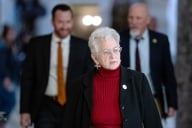You have /5 articles left.
Sign up for a free account or log in.
The University of California at Los Angeles is planning a series of steps -- including possible lawsuits against some animal rights activists -- to protect researchers whose work has been attacked and whose families have been harassed.
"We will not be deterred by the actions of a few fanatic and misguided extremists," said Norman Abrams, interim chancellor of UCLA, in an ad that will be published today in The Daily Bruin announcing the new steps. "Individuals are entitled to their views on animal research and to mount First Amendment-protected protests. But the kinds of activities engaged in by some animal research opponents have crossed the line of legitimate demonstrations and, in a number of instances, have involved patently criminal behavior," he wrote.
Among the steps UCLA is taking:
- Exploring legal steps that may be taken against harassment that is not protected by the First Amendment.
- Filing lawsuits against animal rights "ringleaders" who inspire illegal activity.
- Improving security of faculty members' laboratories and homes, and including the security of professors' family members in university plans.
- Promoting federal legislation to crack down on the harassment of researchers.
- Offering reward funds for an attempted firebombing of a faculty member's home.
The announcement by Abrams follows an upswing in activities in which UCLA professors who work with animals have been targets. In June, the Animal Liberation Front took credit for trying to put a Molotov cocktail on the doorstep of Lynn Fairbanks, a researcher who does experimentation on animals. The explosive was accidentally placed on the doorstep of Fairbanks’s elderly neighbor’s house, and did not detonate, but had enough power to be lethal. This month Dario Ringach, an associate neurobiology professor, decided to abandon his research on primates because of pressure put on him, his family and his neighborhood. UCLA researchers and their family members have received threatening phone calls and e-mail, and had protests at their homes. (UCLA is also under pressure to protect Khaled Abou el Fadl, a professor who is an expert on Islamic law who has been a leading critic of Muslim fundamentalism and who has faced death threats and a bullet fired into his home.)
In the ad, Abrams said that while UCLA respects the rights of critics to offer analysis of anyone's research, the recent incidents are beyond a matter of open debate. He said he was "deeply saddened" by Ringach's decision.
A spokesman for UCLA said that the interim chancellor felt the need to speak out because of the pattern in which the university's researchers have become targets. The spokesman said that UCLA took very seriously its obligation to consider the appropriateness of studies involving animals and to promote their humane care, adding that studies involving animals undergo multiple levels of oversight.
UCLA also can't release too many details about the new steps, the spokesman said, as the university does not want to share too much information with the groups that have been going after its professors.
The recent incidents at UCLA "should be a wake-up call for every university" and the steps the university is taking "are extremely important," said Frankie Trull, president of the Foundation for Biomedical Research, which supports the use of animals in research and spars with animal rights groups.
"Historically universities are open, almost by definition, so they haven't been equipped to provide the kind of security that is now necessary," she said. A number of universities have suffered violent attacks by animal rights groups, she said. For example, individuals claiming to be part of the Animal Liberation Front broke into a psychology laboratory at the University of Iowa, and removed 300 rodents from the facility. Acid was dumped on equipment and books -- and the rodents likely died painful deaths.
While the Iowa incident became public, Trull said that many incidents do not. Some researchers -- especially those fearful of attacks on their young children -- do not publicize harassment. She said that she is helping professors at "a handful" of universities who are currently facing such incidents outside of the public eye.
While campaigns against university researchers who work with animals are nothing new, Trull and UCLA officials said that they have seen a sharp increase in recent months. Trull said that there is no geographic pattern to the attacks, and that many professors who work with animals don't experience any harassment.
Generally, she said, targets are more likely to be professors who work with non-human primates or animals like cats or dogs, since many people have close emotional connections to such animals. Trull also said that animal rights groups are more likely to go after basic researchers. Many members of the public don't understand that basic research is a necessary prelude to studies that can more directly be linked to a cure or treatment for a disease, she said. "It's all about the PR," she said.
The North American Animal Liberation Press Office acts as the mouthpiece for the Animal Liberation Front, whose members are underground, and many of whom are wanted by federal authorities. Officials with the press office did not respond to calls or e-mail messages seeking comment on the UCLA announcement.
But Camille Hankins of the press office told the Los Angeles Times that the chancellor's comments were a "sad commentary" and that the underground group would not stop its activities. "There is a pretty active cell there," she said. "There have been quite a few underground activities and no indication that is going to stop."








